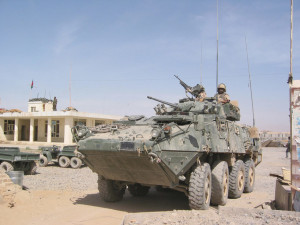The Canadian Army fights from a world class Light Armoured Vehicle built in Canada by a Canadian company. Purchased in the mid-1990’s, their manufacturer General Dynamics Land Systems-Canada (GDLS-C) is now in the middle of a major upgrade that will extend their armoured vehicle’s useful life for another two decades. This domestic industrial capacity and the word class, made-in-Canada equipment it provides to our military would not exist if that company was unable to export its vehicles elsewhere in the world.
This fact has been largely lost in the controversy over the company’s multi-billion dollar export deal to Saudi Arabia. The deal doesn’t just benefit the company, it will bolster the domestic defence industry and the country.
While the Saudi deal is atypically large, unusual for the degree of public discussion and somewhat unique in that it represents the sale of a complete vehicle, rather than a subsystem or component, in many ways it highlights the dynamics of the Canadian defence industry as a whole.
Non-traditional export markets
International exports account for roughly half of the Canadian defence industry’s work, the bulk of which involves the sale of components, subsystems, software or services into international supply chains. Historically, most sales have gone to the United States, by virtue of Canada’s privileged access to that defence market, with a secondary focus on traditional allies, such as NATO members. Given the recent budgetary pressures in those countries, most of which posses robust, government-supported industries of their own, Canadian firms have been looking to non-traditional markets for new sales, including in the Middle East.
Without exports, many Canadian defence firms could not stay in business. Canada’s purchase of defence goods is simply too infrequent, with decades passing between major Canadian defence purchases. And as a recent report points out, even when the Canadian government does launch new efforts to acquire equipment, the majority of these projects recently have been delayed. The infrequency of domestic orders makes it difficult to sustain a viable business, let alone one that produces cutting edge technology. In the case of GDLS-C, in between sales of a few hundred vehicles at a time to the Canadian Army, it has exported thousands of others to international customers.
Benefits to the Canadian economy
Foreign sales allow Canadian firms to keep their plants operating, workforce employed, supply chains intact and engineers busy researching and developing new technology between episodic Canadian government procurements. This particular deal will keep the thousands of unionized shop-floor workers and engineers at the GDLS-C plant in London, Ontario employed for years. It will also fill the order books for the dozens of other Canadian firms in the industrial cluster around Southwestern Ontario and across the country that form part of their supply chain. In addition, it will allow the company to conduct further research to develop its product. All of this benefits the Canadian economy.
Beyond this, Canada will benefit decades from now when the Canadian military next decides to buy new equipment. If export sales permit the company to keep producing Light Armoured Vehicles, Canada will, at least, have the option of buying highly capable, modern equipment in Canada if it so chooses. Foreign sales such as these allow Canada to retain a strategic industrial capability that can supply the Canadian Armed Forces.
Success in winning this type of work is difficult given the highly competitive international marketplace, requiring both good products and good reputations as suppliers. For GDLS-C, this deal represents the continuation of a relationship dating back to the early 1990s when the Saudis first purchased vehicles from the company.
While it was the Harper government that approved the most recent deal in 2014, this represented a continuation of several decades of Canadian government support for this type of contract.
To facilitate these sales, many national governments actively support foreign military sales. In the case of the Saudi deal, it was actually signed by the Canadian Commercial Corporation, a crown corporation that facilitates international trade by Canadian industries with a focus on international governments. By acting as the deal’s prime contractor, the Canadian Commercial Corporation has provided the government of Canada’s backing of the deal in addition to permitting it in the first place following an export control review.
This context is important in lieu of the controversy this deal has generated because of Saudi Arabia’s human rights record.
The deal is not simply about arming a foreign government or generating profit for a large defence company. It promotes domestic economic activity, employment and research and development, and helps maintain a strategically important industry that supplies the government of Canada with national assets.
These other factors were undoubtedly important in shaping the decisions by of the Harper government and other Canadian governments before it to allow the sale of Light Armoured Vehicles to Saudi Arabia.
David Perry is the Senior Analyst and a Fellow with the Canadian Global Affairs Institute. This op-ed originally appeared in the Globe and Mail’s Report on Business.
